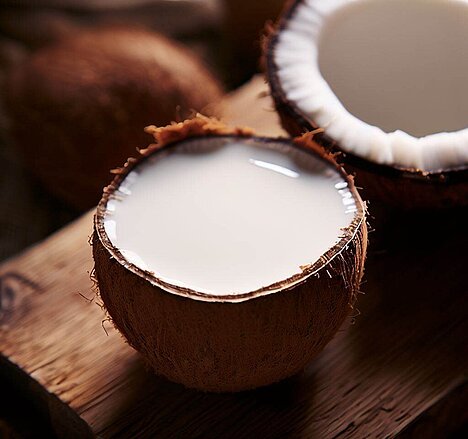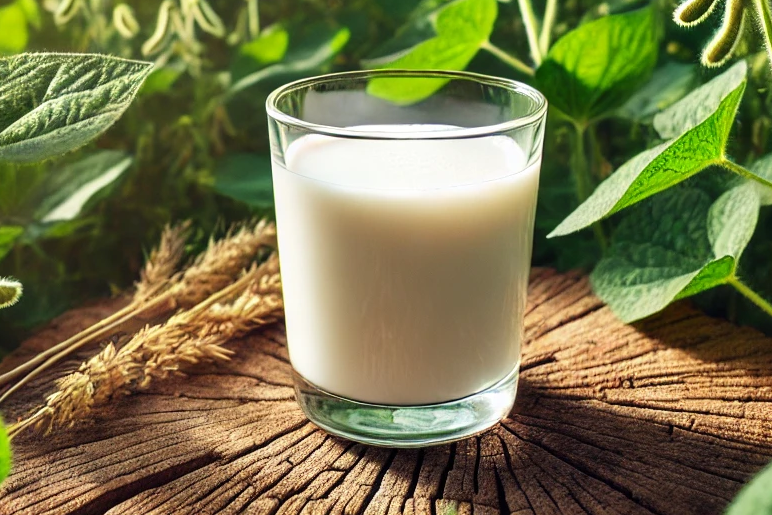Coconut milk

What is coconut milk?
Coconut milk is not to be confused with coconut water, which is the clear liquid inside the coconut. Coconut milk is made by mixing the white flesh of the coconut with water and then squeezing it out. Depending on how much water is used, a thicker or thinner coconut milk is produced. The thicker version is often referred to as coconut cream and has a higher fat content.
What are the benefits of coconut milk for dogs?
Coconut milk contains many healthy ingredients that can be beneficial for dogs. These include:
- Lauric acid: this fatty acid has antibacterial, antiviral and antifungal properties. It can strengthen the immune system, prevent infections and promote healthy skin and coat.
- Medium-chain triglycerides (MCT): These fats are easily digestible and can serve as a quick source of energy. They can also stimulate the metabolism, improve brain function and support weight management.
- Vitamins and minerals: Coconut milk contains vitamin C, B vitamins, iron, potassium, magnesium and zinc, among others. These nutrients can contribute to a balanced diet and support various bodily functions.
What are the disadvantages of coconut milk for dogs?
Coconut milk is not suitable for all dogs and should only be fed in moderation. Possible disadvantages include:
- Calories: Coconut milk is very high in calories and can lead to obesity if consumed in excess. One cup of coconut milk has about 450 calories, which is about a quarter of a medium-sized dog's daily calorie requirement.
- Fat: Coconut milk has a high fat content, which can cause digestive problems such as diarrhea or vomiting in some dogs. In addition, too much fat can increase the risk of pancreatitis (inflammation of the pancreas), a serious condition that requires immediate veterinary attention.
- Allergies: Some dogs may be allergic to coconut or other components of coconut milk. Symptoms of an allergy may include itching, skin rash, swelling or breathing difficulties.
How do you feed coconut milk to dogs?
If you want to give your dog coconut milk, there are a few things you should bear in mind:
- Choose a natural coconut milk with no additives: Many commercial coconut milk products contain sugar, preservatives or other ingredients that can be harmful to dogs. Always read the label and choose a coconut milk without additives or make it yourself from fresh or dried coconuts.
- Start slowly and observe your dog's reaction: Give your dog only small amounts of coconut milk at first and watch for possible side effects such as diarrhea or vomiting. If your dog tolerates the coconut milk well, you can slowly increase the amount, but no more than a tablespoon a day for small dogs or a quarter cup a day for large dogs.
- Mix the coconut milk with your dog's food or water: To better dilute and distribute the coconut milk, you can mix it with your dog's food or water. You can also use coconut milk as a base for homemade treats or ice cubes that you can give your dog as a reward or refreshment.
Coconut milk can have some health benefits for dogs, but also some disadvantages. It should only be fed in small quantities and with caution.
If you notice any signs of hypersensitivity or poisoning in your dog, you should see your vet immediately. We are not a substitute for a vet, but we try to be as accurate as possible. Every dog reacts differently and we recommend you get a second opinion or consult your vet if in doubt.
Stay healthy and take good care of your four-legged friend!😊
Similar to Coconut milk
Almond milk is a plant-based drink made by soaking almonds in water, followed by a grinding and filtration process. The result is a milk-like liquid that is free from lactose, cholesterol and animal...
Soy milk is a plant-based drink made from soaking, grinding and cooking soybeans. It is one of the most popular milk alternatives for people who are lactose intolerant or choose a plant-based diet....
Oat milk is made by soaking oats in water, blending and then filtering. The result is a creamy liquid that retains many of the nutritional benefits of oats, including fiber, vitamins and minerals....
Rice milk is a plant-based drink made by soaking and then processing rice in water. The result is a milk-like liquid that is often fortified with vitamins and minerals to increase its nutritional...



